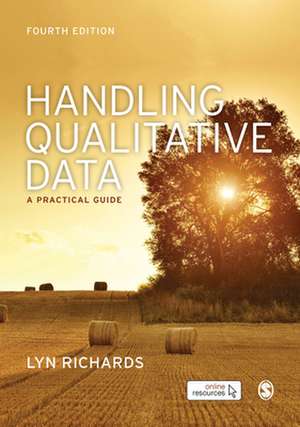Handling Qualitative Data: A Practical Guide
Autor Lyn Richardsen Limba Engleză Paperback – 22 dec 2020
In her positive and jargon-free style, the author discusses how setting up, working with, making sense of and presenting data can be a springboard into learning key research skills and reflecting on methodological issues. New to this edition:
- Ethical practice learning features, such as exercises and reflective questions
- Thoughtful guidance on the newer challenges in handling qualitative data, like data security and access to online data
- New chapters provide clear advice on communicating data to different audiences, and creating impactful data visualizations
- Online resources that illustrate how to work with data in real research projects; including a ‘stepping into software’ space that provides practical tips and guidance on using qualitative analysis software effectively
| Toate formatele și edițiile | Preț | Express |
|---|---|---|
| Paperback (1) | 360.34 lei 3-5 săpt. | +28.76 lei 4-10 zile |
| SAGE Publications – 22 dec 2020 | 360.34 lei 3-5 săpt. | +28.76 lei 4-10 zile |
| Hardback (1) | 753.11 lei 3-5 săpt. | +27.77 lei 4-10 zile |
| SAGE Publications – 22 dec 2020 | 753.11 lei 3-5 săpt. | +27.77 lei 4-10 zile |
Preț: 360.34 lei
Nou
68.95€ • 72.17$ • 57.39£
Carte disponibilă
Livrare economică 10-24 martie
Livrare express 21-27 februarie pentru 38.75 lei
Specificații
ISBN-10: 1526490773
Pagini: 336
Dimensiuni: 170 x 242 x 22 mm
Greutate: 0.54 kg
Ediția:Fourth Edition
Editura: SAGE Publications
Colecția Sage Publications Ltd
Locul publicării:London, United Kingdom
Recenzii
Strengthening an already impressive publication, Richards has produced an excellent addition to the literature on qualitative research. The signposting of additional resources within the text allows readers to further hone their analytical skills. Written in an accessible format, I would recommend this to both experienced researchers and those beginning their research journey.
Cuprins
Chapter 1 Setting up your project
Chapter 2 Qualitative data
Chapter 3 Data records
Part 11 Working with the data
Chapter 4 Up from the data
Chapter 5 Coding
Chapter 6 Handling Ideas
Part III Making sense of your data
Chapter 7 What are you aiming for?
Chapter 8 Searching the data
Chapter 9 Seeing a whole
Part IV Telling your project
Chapter 10 Getting it together
Chapter 11 Writing the project report
Chapter 12 Telling it
Notă biografică
About the author
Lyn Richards has a highly unusual range of relationships with qualitative research. After undergraduate training as a historian and political scientist, she moved to sociology. Her early work as a family sociologist addressed both popular and academic audiences, with a strong motivation always to make the funded research relevant to the people studied, and the qualitative analysis credible to those affected. Each of her four books in family sociology was a text at university level but also widely discussed in popular media and at community level. During her tenure as Reader and Associate Professor at La Trobe University in Melbourne, she won major research grants, presented and published research papers, was a founding member of a qualitative research association and taught qualitative methods at undergraduate and graduate level, supervising Masters and PhD students.
She strayed from this academic pathway when challenges with handling qualitative data in her own studies led to the development, with Tom Richards, of what rapidly became the world¿s leading qualitative analysis software. They founded a research software company, in which for a decade Lyn was Director of Research Services, writing software documentation and managing international training of researchers and trainers in the methods behind the software. Designing and documenting software taught her to confront fuzzy thinking about methods, and to demand straight talking, clarity of purpose, detail of technique and a clear answer always to `Why would we want to do that?¿ Teaching methods to thousands of researchers in dozens of disciplines in 14 countries, she saw what worked and what didn¿t. From those researchers, graduates and faculty in universities and research practitioners in the world beyond, she learned their many ways of handling data, on and off computers, and their strategies for making sense of data.
Handling Qualitative Data is a direct result of this experience. It offers clear, practical advice for researchers approaching qualitative research and wishing to do justice to rich data. Like her previous book, with Janice Morse, Readme First, for a User¿s Guide to Qualitative Methods it strongly maintains the requirements of good qualitative research, assumes and critiques the use of software and draws on practical experience of helping researchers whose progress has been hindered by confusion, lack of training, mixed messages about standards and fear of being overwhelmed by rich, messy data.
Throughout this hybrid career, Lyn continued contributions to critical reflection on new methods, as a writer and a keynote speaker in a wide range of international conferences. She has life membership of the International Sociological Association and its Methodology section. Her writing aims always to cut through barriers to high quality qualitative research and to assist researchers and teachers in making the inevitable shift to computing whilst maximizing the benefits for their research processes and outcomes. On leaving software development, she took an Adjunct Professorship at RMIT University, creating and coordinating an active, informal and splendidly supportive Qualitative Interest Group (QIG). She currently works from home, (online, of course), combining research advising with convening of an asylum seeker support group and growing roses and vegetables, all of which provide marvellous metaphors for qualitative research.
